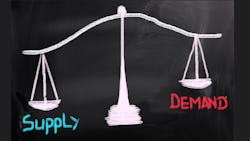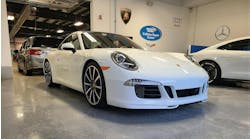In my senior year of college, I had an economics class supply and demand module to complete that lasted the entire semester. It was a group project, and I became the team lead where we operated in a fictitious “widgets” market to help us identify the concepts of demand, supply, and market equilibrium. Each week, our teams submitted their data and teams were compared with one another. We started out slow, but we finished with one of the highest project scores in the class. I was proud of that. I learned a lot from that professor and that class and thoroughly enjoyed it. Now more than 30 years later, we apply those same fundamentals in our auto collision repair shop.
Our shop is located in a college football town, where we see things like hotels, restaurants and fuel cost spikes during home football games and other things associated with college activities. You see it, too, when you travel during peak times, including airfare prices. We certainly saw it in 2020 during COVID, when manufacturers and builders were affected by labor shortages and high demand. I suspect you could think of other things, also.
Labor costs are dynamic
Auto collision repair shops sell parts, material, labor and sublet labor operations. Parts, material and sublet are relatively stable. After all, in most cases parts have manufacturer “suggested” list prices; however, these may have to be adjusted if the margins do not reflect a fair markup percentage to order, purchase, receive, inspect, unbox, compare, and float the cost until the job is delivered. Materials and sublet should be based on actual cost and marked up according to your profit goal. However, labor costs are very dynamic and should be based on a number of factors including supply and demand. What do I mean by many factors? I am referring to the type of car, type of damage, technician skill level required to complete the work, customer in a rush, etc. You should also consider your shop's capabilities and backlog. After all, insurance costs vary by car type. I own multiple vehicles and each one of them has a different cost to insure. Insurers set auto rates based on numerous factors. It doesn't make sense that it costs different amounts to insure them, but yet it should cost the exact same to repair them. Think about that!
What's your 'sweet spot' for your work backlog?
Over the years, we have experimented with this pricing strategy. We have determined that a customer who wants to use your shop will wait about three weeks to be scheduled. Anything much longer than this, and a customer might consider using another shop that could schedule the repair sooner. In order to balance this act, we have implemented supply and demand labor pricing. As a rule of thumb, we adjust our labor pricing if our backlog is more than three or four weeks out. I know of shops booked out for months and they are still offering the same pricing. You know what I’m talking about. We have also adjusted our labor pricing downward when we have experienced a slowdown. It has been quite amazing to monitor both sides of the implementation. When we adjust our prices up, the demand will slow and when we adjust them down, the demand will increase, and it is all affected by the overall demand in the marketplace.
Should you be limited to 'average market rate?'
Insurance companies have brainwashed our industry to believe that we should all charge the exact same thing. In order to do that, we should all be equipped the same and have the same overhead and operating cost. It's just not reasonable to buy into that way of thinking. Their terminology of “average market rate” is used to control consumers' way of thinking. In other words, if the ABC shop charges more than the XYZ shop, then ABC is “not competitive.” I bet you have heard that before. Can you be considered “competitive” if you have the nicest facility, more services, equipment, and invest in training if your pricing is a little more than your competitor? I believe that you can justify it as competitive! You will have to determine what “competitive” is for yourself. Obviously, insurers do this to control pricing in the market. That is not news to you, but I certainly hope it's a reminder that it has been created by an entity other than the true marketplace.
Is this strategy for you? First of all, you must know what it costs you to operate and what you should use as a basis for labor charges. Best way to do this is to consult the help of an accountant. Once that is done, you could implement this strategy based on the demand or lack of demand at your shop.
Is this strategy legal? I am not an attorney and rules may be different in your state, but it may be illegal for you not to! Below is an excerpt from the Federal Trade Commission regarding price fixing:
Price fixing is an agreement (written, verbal, or inferred from conduct) among competitors to raise, lower, maintain, or stabilize prices or price levels. Generally, the antitrust laws require that each company establish prices and other competitive terms on its own, without agreeing with a competitor. When purchasers make choices about what products and services to buy, they expect that the price has been determined on the basis of supply and demand, not by an agreement among competitors”.
I have attached a link to it here for those of you who would like to read the entire article: https://www.ftc.gov/advice-guidance/competition-guidance/guide-antitrust-laws/dealings-competitors/price-fixing
For the fun of it, I also found a supply and demand module online that seems to be very similar to what I participated in many years ago. You may want to try it for yourself. It can be found here. https://www.stlouisfed.org/education/supply-demand-short-courses
It is now a “chocolate” module. Should be fun. Let me know your thoughts if you complete the homework assignment.





